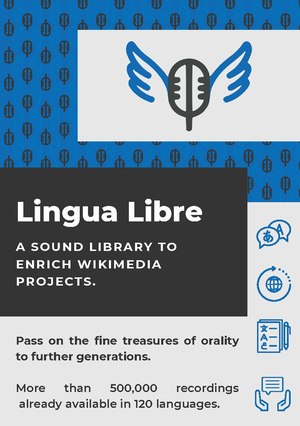LinguaLibre
Workshops
LinguaLibre's workshops gathers various kind of real-life and online events promoting the creation of audios via LinguaLibre rapid recording, by demoing it, mentoring hand-on usage of Special:RecordWizard Studio or via other ways. This page introduces and provides resources for each type of those workshops. Both conceptual and practical resources will be covered.
This page gather possible grants for LinguaLibre's contributors. In most case then may Wikimedia grants can finance events, meetings to contribute, food, transportation, hotels, books and devices. Notable coding projects can also enter this scope. Recording contributions cannot be financed by the Wikimedia organizations. Please help us to keep this page up to date and to proactively forward this resources with potential beneficiaries, especially in languages-rich countries.
Generalities
- User Interface and teaching principles.
On site workshop
- Example: 2021 INALCO.
Online workshop
- Example: 2021 Wiki Meet India.
Personal challenge
- Example: User:Titodutta early 2021's 50,000 words challenge.
Sporsorship
- Example: Cantonese 2020.
A private citizen paying an audio-voice professional to records a list of words in his language is also a de facto option. Wikimedia cannot, by rule, pay for content. But given the high productivity of Lingualibre's studio (Special:RecordWizard), it becomes affordable, efficient and profitable for private citizen or institutions to lead such operation, hire an audio professional who will mass record. A first experiment was made with Cantonese. A modest 300€ lead to the creation of 5,000+ audios files within 3 weeks. These 5,000 words make up around 95% of daily Cantonese conversations. Cantonese can therefore be considered as largely covered, on the teaching side at least. For a more exhaustive coverage, 30,000 would be a better target.
This approach is especially needed and promising for rare languages, where volunteer contributors are and will stay hard to find. Sometimes, sponsoring contribution could boost a language. With such low amounts involved, a private or institutional donor can likely be found.
Editathon
- Example: n.a.
Editathons aim to gather and synchronize a group of interested users into editing Lingualibre's content pages. It could be the Help documentations (Help:*), project space (LinguaLibre:*), currenting wordlists (List:*/*).
Hackathon
- Example: 2018 at Wikimedia France's Paris headquarter.
Hackathon aim to gather and synchronize a group of interested users into taking over Lingualibre's codes (see github.com/lingua-libre) and features/bugs tickets (phabricator:tag/lingua_libre).
Skills we are looking for are mainly organizational skills for events management, then JS and VueJS (web developments) ; PHP (mediawiki) ; Python (bots).
Outreach workshops
- Example: n.a.
An vastly overlooked aspect of Lingualibre is the networking and communication side. Following April 2021 site-wide upgrade LinguaLibre's rapid-recording-as-a-service is technically stable, mature, and satisfying. The real need is in letting the outside world know how the recording studio makes rapidly and clean audio recording possible and easy. Early outreach has been limited to French Wikimedians and as since expanded toward European and Indic Wikimedians. These Wikimedia groups returns a unbalanced by geography and gender.
- On demographic, the simplicity of the recording studio actually make contributing to LinguaLibre accessible to all public, 7-99 years old. Outreach needs and opportunities are toward older, younger, and more feminine groups.
- On geography, an effort is underway to translate the recording studio, but similarly, outreach to local communities abroad is missing.
- On institutional side, various existing community have been working to document the diversity of languages for years already. These volunteer or academic communities have better field experience, trust, contacts with diverse languages. On this sides we can cite the Endangered Language Alliances of New York City (elalliance.org), the National Institute of Languages and Civilisations in Paris (100+ languages), the School of Oriental and Asian Studies in London (~35 languages), the UNESCO, etc.
Each of these groups has various sub-groups, not aware of how « LinguaLibre makes rapid, clean, mass recording possible ». There are opportunities to gently ping these communities via multiples entries points, assess these communities actual appetite for rapid recording, send them flyers ? The field is actually quite new with custom solutions to find.
Funding
- Example: Wikimédia France's Microfi. See also LinguaLibre:Grants.
The table below is an indicative summary but not authoritative. Please refer and engage with to each grant as needed to clarify if your idea fits their needs and rules.
Grants
See meta:Template:Grants.
See also

